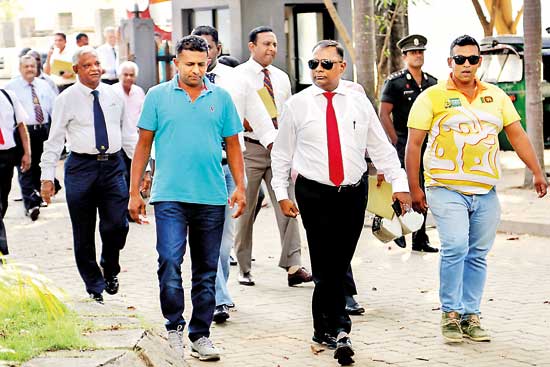Coup de Grace risks Sri Lanka’s existence in Olympic movement
The International Olympic Committee (IOC) and Olympic Council of Asia (OCA) have placed NOCSL under scrutiny due to governance failures and corruption allegations, particularly involving suspended Secretary General Maxwell de Silva. In response, both organisations have suspended funding to NOCSL until it eliminates corrupt elements and demonstrates commitment to Olympic principles of transparency, accountability, and good governance.

When incumbent NOC President Suresh Subramaniam first entered the Olympic House in 2018, he had the backing of many, but now things are running in reverse despite mounting pressure from global entities - File pic
NOCSL President Suresh Subramaniam is reportedly seeking urgent intervention from the IOC and OCA as the organisation faces paralysis. A faction loyal to de Silva appears determined to seize control, which could halt the ongoing forensic audit and potentially reinstate officials accused of corruption.
The recent SGM, intended to appoint officials to vacant positions, ended in stalemate after four hours when President Subramaniam opposed reinstating suspended Acting Secretary General Chandana Liyanage. A constitutional dispute emerged, with Subramaniam citing the 2020 Constitution giving him broader powers, while Liyanage’s supporters referenced the IOC-approved 2018 Constitution that limits presidential authority. Sources said the latest Constitution did not have the IOC approval, thus the 2018 Constitution prevails.
Subramaniam says Liyanage had allegedly colluded with former Secretary General Maxwell de Silva in ‘several unethical activities’ during his tenure. Second, ‘several financial irregularities and/or discrepancies’ were discovered during Liyanage’s chairmanship of the Procurement Committee, though specific details of these discrepancies were not disclosed in the letter.
Perhaps most damning, is the allegation that Liyanage accepted per diem payments for four major international sporting events—the 2022 Commonwealth Games in Birmingham, the 2018 and 2023 Asian Games in Jakarta and Hangzhou respectively, and the 2024 Olympic Games in Paris—in direct contravention of Article 25 of the NOCSL Constitution, which explicitly prohibits such payments.
Also Liyanage allegedly bypassed President Subramaniam’s authority by directly corresponding with Jerome Poivey, the Associate Director of Institutional and Governance Services at the IOC, on December 4, 2024. This action violated Article 15(1) of the NOCSL Constitution, which designates the President as the legal representative of the organisation.
This crisis has built over months. After de Silva’s suspension for alleged financial impropriety, both Treasurer Gamini Jayasinghe and Vice President Suranjith Premadasa resigned under pressure from international Olympic bodies. An earlier SGM attempt on April 8, 2025, failed when members boycotted in protest of the Assistant Secretary’s suspension.
Sport governance experts note that these suspensions and resignations have exposed the extent of institutional dysfunction within NOCSL, which has struggled with transparency and integrity issues for the past two years.
The conflict pits reformers against status quo defenders. The faction aligned with suspended officials is pushing for early elections despite IOC and OCA instructions that no elections should occur until the completion of the current term. This appears designed to short-circuit reforms and reinstate implicated officials before investigations conclude.
To restore credibility, NOCSL must follow IOC and OCA guidance by addressing entrenched corruption. If Sri Lanka fails to resolve these issues promptly, it risks Olympic movement exclusion, with severe consequences for the country’s athletes and sporting future. The coming weeks will determine whether NOCSL can overcome internal divisions and commit to meaningful reform or continue its decline into further disarray and international isolation.


